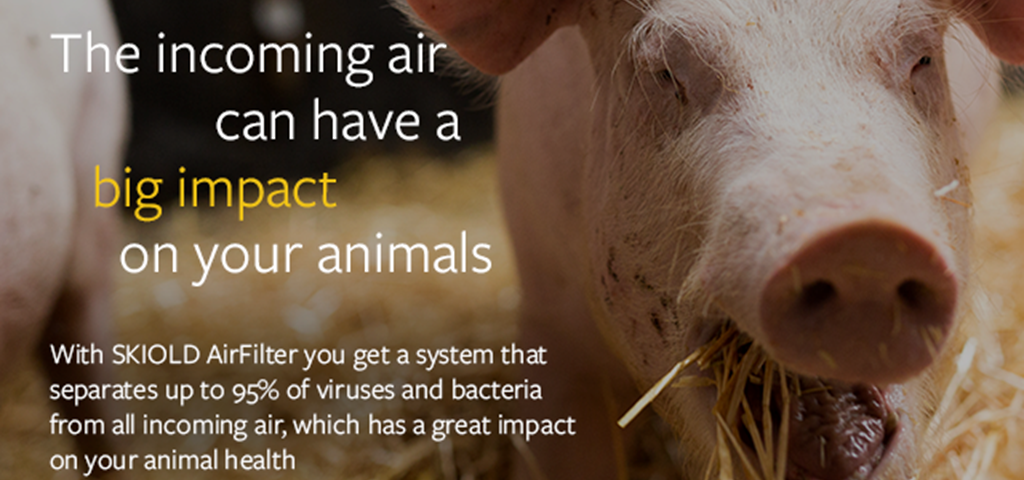
SKIOLD Airfilter Solution
Enhance air quality in your farming facilities and improve both animal and employee health and welfare
In the realm of agriculture, the quality of the air within facilities is not just a matter of environmental control—it's a critical component of operational success. Air quality directly impacts animal health, the efficiency of production processes, and the overall sustainability of agricultural operations. Poor air conditions can contribute to the spread of diseases, affect the growth and welfare of livestock, and ultimately influence the economic viability of farms.
Recognizing the pivotal role of clean air in these settings, SKIOLD has dedicated itself to the development of cutting-edge solutions that address these challenges head-on. With a legacy rooted in over 140 years of innovation in agricultural technology, Skiold's commitment to enhancing farm environments is embodied in our advanced AirFilter solution. This system not only optimizes air quality but does so with an eye towards energy efficiency, cost-effectiveness, and minimal environmental impact.
Our approach combines rigorous scientific research with practical experience, ensuring that each solution not only meets but exceeds the expectations of modern agricultural professionals. By focusing on innovative technologies that improve both productivity and sustainability, Skiold continues to lead the way in creating healthier, more efficient farming environments across the globe.
The need for advanced air filtration in agriculture
Agricultural environments, particularly those involving livestock, face unique air quality challenges that can significantly impact the overall health and productivity of a farm. Common issues such as dust, ammonia, pathogens, and various particulates not only degrade the quality of the air but also pose serious health risks to animals and workers alike. In confined spaces such as barns and coops, these contaminants can accumulate to harmful levels, driven by factors including animal waste, feed particles, and the use of machinery.

Common air quality challenges
- Dust and particulate matter: Livestock operations generate significant amounts of dust from feed, bedding materials, and animal dander. Inhalation of dust can lead to respiratory issues in both animals and humans and contribute to the deterioration of facilities.
- Ammonia emissions: Arising primarily from animal urine and feces, ammonia is a potent irritant that can damage respiratory tracts and reduce immune responses, making animals more susceptible to diseases.
- Pathogens and odors: Microbial contaminants, including bacteria and viruses, can thrive in unfiltered air, spreading disease throughout a facility. Additionally, odors produced by decomposing organic matter can create unpleasant and unhealthy conditions.
Impact on Livestock Health and Farm Productivity
Poor air quality in agricultural settings can lead to a range of negative outcomes, including:
- Decreased animal welfare: Animals breathing poor quality air may suffer from chronic stress, reduced immunity, and increased incidence of respiratory diseases, all of which can negatively affect their welfare and longevity.
- Reduced productivity: Health issues related to air quality can lead to decreased productivity in terms of growth rates, milk yield, and reproductive performance. Livestock in poor health typically require more medications and interventions, increasing operational costs.
- Worker health risks: The health of farm workers is also at risk from poor air quality, leading to higher incidences of respiratory conditions, lost workdays, and increased healthcare costs, which can contribute to labor inefficiencies.
- Regulatory and compliance challenges: Increasingly, agricultural operations are subject to environmental regulations that mandate certain air quality standards. Failure to meet these standards can result in fines and sanctions, further affecting the economic stability of a farm.
The need for advanced air filtration systems like the SKIOLD AirFilter solution is clear. By addressing these air quality challenges, farms can protect their livestock, enhance productivity, and create safer, more compliant agricultural environments. The subsequent sections will delve into how the Skiold AirFilter meets these needs, detailing its features, benefits, and the underlying technology that sets it apart from other solutions in the market.

Overview of SKIOLD AirFilter Solution
The SKIOLD AirFilter system represents a leap forward in agricultural air purification technology, designed to tackle the unique environmental challenges of farming operations. Engineered with precision and sustainability in mind, this solution is aimed at enhancing air quality in a way that supports both animal welfare and farm productivity.
The AirFilter technology
The SKIOLD AirFilter technology utilizes a multi-stage filtration process that effectively removes particles, gases, and pathogens from the air within agricultural settings. It incorporates:
- Pre-Filters: These capture larger particles, extending the life of subsequent finer filters and improving overall efficiency.
- HEPA Filters: High-Efficiency Particulate Air (HEPA) filters trap 99.97% of particles that are 0.3 microns in diameter or larger, ensuring that the smallest dust particles, pollen, and other allergens are removed from the air.
- Activated carbon filters: These filters absorb gases and odors, such as ammonia, which are common in agricultural environments, thus neutralizing smells and reducing chemical irritants.
- UV-C light treatment: This stage uses ultraviolet light to kill or deactivate pathogens, providing an additional layer of biosecurity by reducing the spread of airborne diseases.
Key features
- Energy efficiency: The system is designed to operate with minimal energy consumption, reducing costs while maintaining high performance.
- Automated control system: Integrated sensors monitor air quality in real-time, adjusting the filtration process automatically to maintain optimal conditions.
- Modular design: The modular setup allows for easy customization and scalability, fitting various building sizes and types seamlessly.
- Low maintenance: Designed for durability and ease of use, the system requires minimal upkeep, thanks to its robust construction and self-cleaning components.
How the SKIOLD AirFilter works
The operation of the SKIOLD AirFilter is a sophisticated process, structured to ensure maximum efficacy in purifying the air within agricultural facilities. Here's a step-by-step explanation of how it functions:
- Air intake: Contaminated air is drawn into the system through intake vents strategically placed to maximize coverage.
- Pre-filtration stage: Larger particles are filtered out by pre-filters, which protect finer filters from rapid wear and tear.
- HEPA filtration: Air passes through HEPA filters, where virtually all microscopic particles are captured, significantly clearing the air of pollutants.
- Carbon filtration: The cleansed air then flows through activated carbon filters, which absorb gases and odors, crucial for maintaining a neutral and non-irritating environment.
- UV-C treatment: Finally, the air is exposed to UV-C light, eliminating bacteria, viruses, and fungi, ensuring that the air returned to the facility is not only clean but hygienic.
Benefits of implementing SKIOLD AirFilter

Improved animal health and welfare
Implementing the SKIOLD AirFilter system directly contributes to the health and welfare of livestock by maintaining a clean and disease-free environment. The reduction of airborne contaminants, including dust, pathogens, and irritating gases like ammonia, means that animals experience fewer respiratory issues and infections. Healthier animals not only live more comfortably but also show improved growth rates and reproductive health, which are critical factors for the success of livestock farming.
Enhanced farm staff working conditions
Clean air is not only crucial for animals but also for the people who take care of them. The SKIOLD AirFilter system significantly improves the air quality in farming facilities, which leads to a healthier working environment. This improvement can decrease the occurrence of respiratory conditions among farm staff, reduce absenteeism, and enhance overall workplace satisfaction. A healthier work environment also promotes better job performance, which can lead to more efficient farm operations.
Potential for increased productivity and efficiency on farms
The overarching benefit of cleaner air is reflected in the overall productivity and efficiency of farm operations. By fostering an environment where both animals and staff are healthier, farms can operate more smoothly. For example, improved air quality can lead to higher milk production in dairy farms and better growth rates in poultry and swine operations. Furthermore, the system’s automated features allow for constant monitoring and adjustment of air quality without the need for manual intervention, optimizing energy use and reducing operational costs.
Expertise and development
Research and development process behind the AirFilter
The development of the SKIOLD AirFilter system is the result of extensive research and collaboration with veterinary health experts, engineers, and agricultural professionals. This integrated approach ensures that the system is scientifically advanced and tailored to meet the specific needs of modern agriculture. The R&D process includes rigorous testing under various environmental conditions to guarantee reliability and effectiveness in real-world agricultural settings.
Highlighting SKIOLDs expertise and credentials
SKIOLD has long been recognized as a leader in agricultural solutions, with over a century of experience in developing technology that supports sustainable and profitable farming. Our commitment to innovation is underpinned by a deep understanding of the agricultural sector, allowing it to devise solutions that are both practical and revolutionary. Our expertise is further solidified by its active participation in agricultural research initiatives and its collaboration with academic and industry leaders to stay at the forefront of technological advancements in agriculture.
FAQ
Q1: How does the SKIOLD AirFilter system improve air quality?
A1: The SKIOLD AirFilter system uses a combination of pre-filters, HEPA filters, activated carbon filters, and UV-C light treatment to remove dust, pathogens, gases, and odors from the air, ensuring a clean and healthy environment for both livestock and farm staff.
Q2: Is the SKIOLD AirFilter system difficult to install?
A2: No, the system is designed with a modular approach, making installation straightforward. We also offer professional installation services and support to ensure optimal setup and operation.
Q3: Can the AirFilter system be customized for different farm sizes?
A3: Yes, the SKIOLD AirFilter is highly adaptable and can be customized to fit various building sizes and types, ensuring efficient air filtration regardless of the scale of your operation.
Q4: What maintenance is required for the AirFilter system?
A4: The SKIOLD AirFilter system is designed for easy maintenance. Regular checks and replacement of filters are the primary maintenance tasks, and detailed guidelines are provided to simplify these processes.
Q5: How cost-effective is the AirFilter system in the long run?
A5: While the initial setup cost may be an investment, the system's energy efficiency and the health benefits it provides lead to significant savings in healthcare, increased productivity, and reduced operational costs over time.
Conclusion
The SKIOLD AirFilter system stands out as a premier solution for addressing air quality challenges in agricultural settings. By significantly improving the air within farming facilities, it enhances the health and welfare of livestock and creates a safer, more comfortable working environment for staff. The benefits of implementing such a system translate directly into increased productivity and efficiency, promoting a more sustainable and profitable operation.
For those interested in exploring how the SKIOLD AirFilter can benefit your specific agricultural setup, we encourage you to reach out to our team. We offer detailed consultations and can provide customized solutions tailored to meet the unique needs of your farm. Contact us today to learn more about our innovative products and to schedule a consultation that could transform the quality of your agricultural environment.
Read more:
Now we sleep better at night | SKIOLD Airfilter
Protection against vira and bacteria in your pig house | SKIOLD
SKIOLD AirFilter system - Skiold


 English
English
 Danish
Danish
 French
French
 Swedish
Swedish
 Vietnamese
Vietnamese
 Spanish
Spanish
 German
German
 English
English







